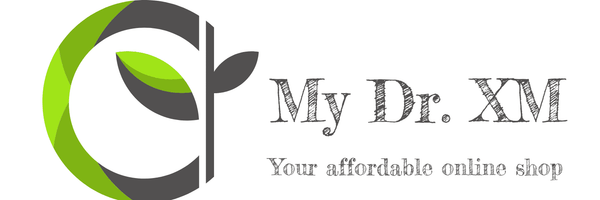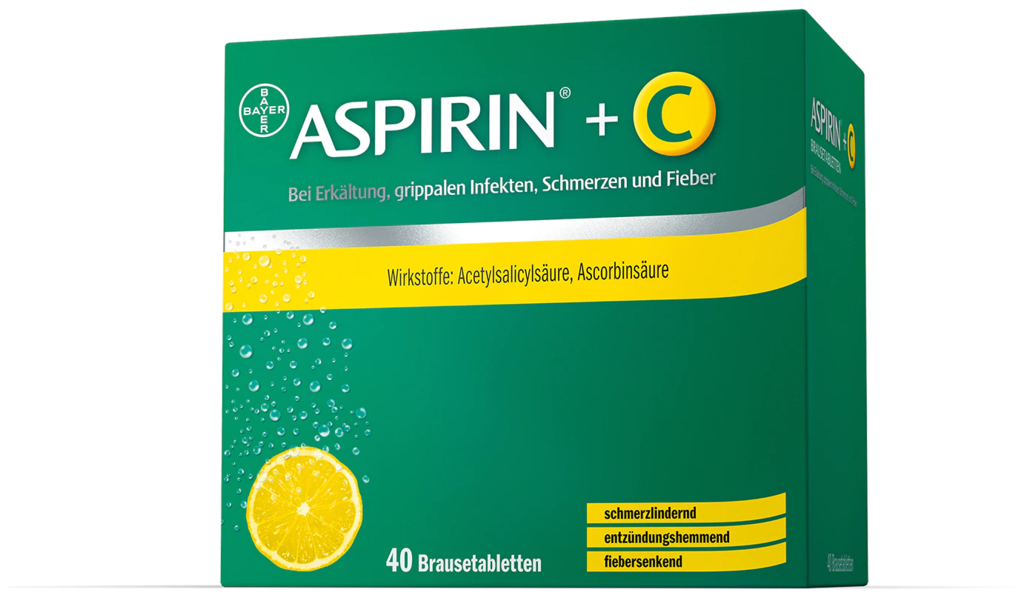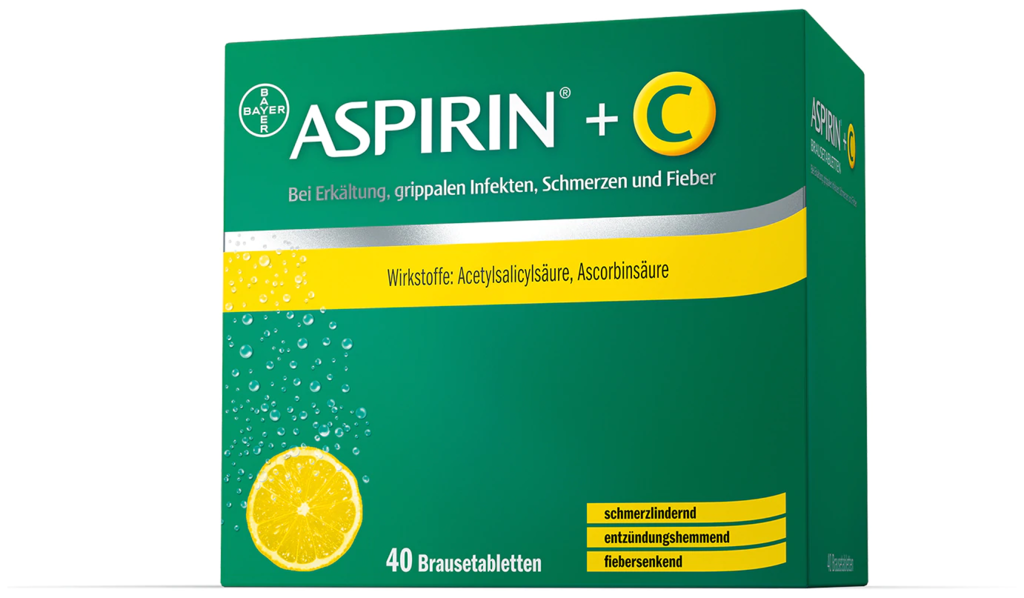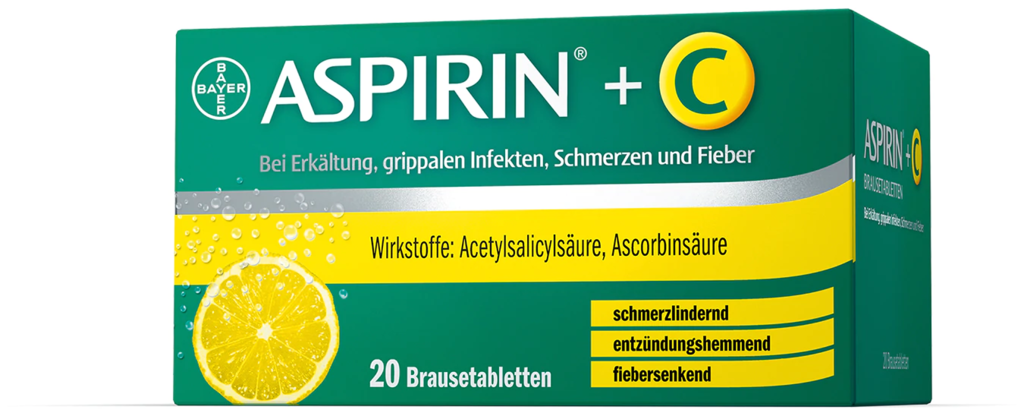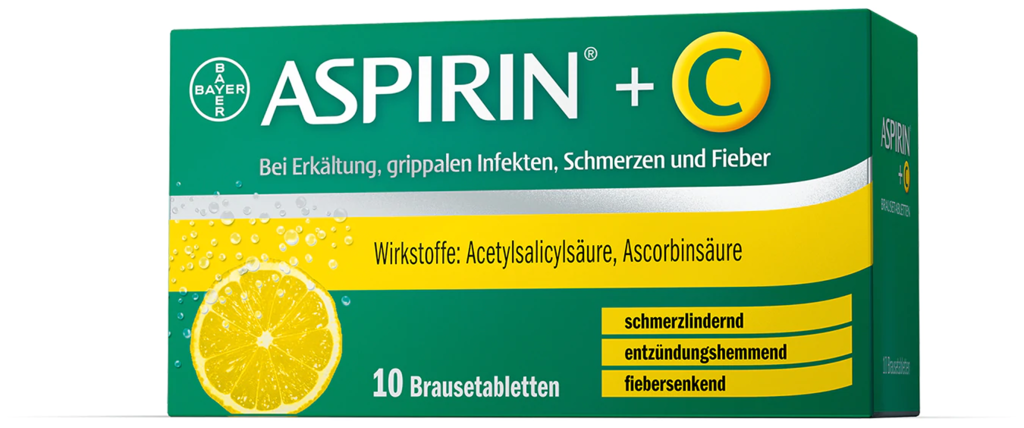Bayer
Aspirin +C - Effervescent tablets
Aspirin +C - Effervescent tablets
Couldn't load pickup availability
Aspirin+C effervescent tablets contain the active ingredient acetylsalicylic acid (ASA). This has an analgesic, antipyretic and anti-inflammatory effect. The addition of vitamin C in the effervescent tablets helps to meet the increased need for this vitamin in febrile colds and flu-like infections.
Application
Symptomatic treatment of mild to moderate pain such as headaches, toothache and menstrual pain.
For the relief of pain and fever in colds and flu-like infections.
If you do not feel better or even worse with pain after 3-4 days and with fever after 3 days, when new symptoms appear (for example, redness or swelling), it is imperative to consult a doctor, as these can be signs of a serious illness.
Please refer to the information for children (see section 2).
Contraindications
Aspirin+C effervescent tablets must not be taken,
- if you are allergic to the active substances acetylsalicylic acid and ascorbic acid, other salicylates or to any of the other ingredients of this medicine (listed in section 6);
- if you have a history of asthma attacks or otherwise hypersensitive to certain pain-relieving medicines - acetylsalicylic acid or substances with a similar mechanism of action (non-steroidal anti-inflammatory drugs);
- if you suffer from acute gastrointestinal ulcers;
- if you have a history of bleeding, ulcers or breakthrough in the gastrointestinal tract due to previous therapy with NSAIDs (non-steroidal anti-inflammatory drugs);
- if you have active gastrointestinal ulcers/bleeding or if you have a history of bleeding, ulcers or a breakthrough in the gastrointestinal area;
- if you suffer from pathologically increased bleeding tendency (hemorrhagic diathesis);
- if you suffer from severe liver dysfunction;
- if you suffer from severe renal dysfunction;
- if you suffer from severe heart failure (heart failure);
- if you are taking 15 mg or more per week of methotrexate (medicines used to treat cancer or certain rheumatic diseases) at the same time;
- if you are taking anticoagulants (medicines to "thin the blood") at the same time, if high doses of salicylates are used;
- in the last 3 months of pregnancy;
- if you suffer from hyperoxaluria (a certain condition with a tendency to form kidney stones).
Aspirin+C effervescent tablets should not be given to children under one year of age.
Interactions
The effect of the following drugs or groups of preparations can be influenced by simultaneous treatment with Aspirin+C effervescent tablets.
Contraindicated combinations
If you are taking methotrexate (medicines used to treat cancer or certain rheumatic diseases) at doses of 15 mg/week or more, do not take Aspirin+C effervescent tablets.
If you are taking anticoagulants (medicines used to "thin the blood"), you must not take high doses of Aspirin+C effervescent tablets.
Combinations that require special care:
- Methotrexate at doses below 15 mg/week (medicines used to treat cancer or certain rheumatic diseases) - there is a risk of increased (side) effects of methotrexate.
- Anticoagulant medicines, blood clot-dissolving medicines/other medicines that inhibit platelets sticking together and clumping together (antiplatelet agents)/medicines to inhibit hemostasis (haemostasis inhibitors) - bleeding can occur due to increased action. Aspirin+C effervescent tablets may increase the risk of bleeding if taken before a treatment designed to dissolve blood clots. Therefore, you need to pay close attention to signs of external or internal bleeding (for example, bruising) if you are to undergo such treatment. A medical check-up is absolutely necessary.
- Other analgesic and anti-inflammatory drugs (non-steroidal anti-inflammatory drugs/anti-inflammatory drugs) at high doses of acetylsalicylic acid: increased risk of ulcers and bleeding in the gastrointestinal tract; an overdose is also possible.
- Certain medicines used to treat depression (selective serotonin reuptake inhibitors): the risk of bleeding in the gastrointestinal tract increases.
- Certain medicines for the treatment of cardiac insufficiency and for the treatment of certain cardiac arrhythmias (digoxin): Enhancement of the effect up to increased risk of side effects. Appropriate monitoring and, if necessary, dose adjustment by the doctor is recommended.
- Certain medicines for gout (eg, probenecid, benzbromarone). Weakening of the effect of gout remedies possible. It is recommended to use another painkiller.
- Medicines for diabetes (e.g. insulin, sulfonylureas): hypoglycaemia can occur due to increased effect. More frequent blood glucose self-checks are recommended.
- Certain medicines for dehydration and lowering blood pressure (diuretics): there is a risk of severe renal dysfunction. When taken at the same time, it is important to ensure sufficient fluid intake. Certain dehydrating agents (e.g. furosemide) may weaken the antihypertensive effect, so blood pressure checks are recommended.
- Medicines containing cortisone or cortisone-like substances (with the exception of products applied to the skin or hydrocortisone in cortisone replacement therapy for Addison's disease): increased risk of side effects (bleeding or ulcers) in the gastrointestinal tract.
- Certain medicines for high blood pressure (antihypertensives) and/or cardiac insufficiency ("ACE inhibitors", aldosterone antagonists): there is a risk of severe renal dysfunction and the antihypertensive effect may also be reduced. When taken at the same time, it is important to ensure sufficient fluid intake. Blood pressure checks are recommended.
- Certain medicines for epilepsy (valproic acid): There is a risk of increased (side) effects of valproic acid.
- The intake of Aspirin+C effervescent tablets leads to increased absorption of iron and aluminum from the gastrointestinal tract due to the vitamin C component. This is especially important in the case of renal dysfunction, iron replacement therapy and the use of aluminum-containing drugs to neutralize gastric acid (antacids).
- Certain medicines used to treat iron or aluminium overload: Taking aspirin+C at the same time can lead to increased cell damage caused by iron, especially in the heart, as well as deterioration of heart function due to the vitamin C component.
- Locally active gastrointestinal preparations: magnesium, aluminum and calcium salts, oxides and hydroxides.
Please also note that:
Aspirin+C effervescent tablets in higher doses may alter the results of laboratory tests, so inform your doctor about taking Aspirin+C effervescent tablets.
Taking Aspirin+C effervescent tablets together with alcohol
Please avoid drinking alcohol during the treatment period with Aspirin+C effervescent tablets, as the side effects of the drug may be increased (risk of bleeding in the gastrointestinal tract, prolonged bleeding time).
Pregnancy, lactation and fertility
If you are pregnant or breastfeeding, or if you think you may be pregnant or intend to become pregnant, ask your doctor for advice before taking this medicine.
Pregnancy:First and second trimester of pregnancy:
During the first six months of pregnancy and if you wish to have children,
you should only take Aspirin+C effervescent tablets after consulting your doctor. The aim is to keep the dose low and the treatment as short as possible.
Third trimester of pregnancy:
In the last three months of pregnancy, you must not take aspirin+C effervescent tablets due to an increased risk of complications for mother and child.
Due to the acetylsalicylic acid component, there is a risk of developmental disorders in the unborn child (malformations in the circulatory system and/or renal dysfunction up to kidney failure).
During childbirth, there may be increased bleeding in mother and child and delay/prolongation of the birth process.
Lactation:
The active ingredient acetylsalicylic acid and its degradation products are excreted in breast milk in small quantities. Vitamin C is also excreted in breast milk. With short-term use of Aspirin+C effervescent tablets and low dose, interruption of breastfeeding will not be necessary. However, if you use or take high doses for a longer period of time, you should stop weaning.
Recreation/fertility:
Aspirin+C effervescent tablets belong to a group of medicines (non-steroidal anti-inflammatory drugs) that can affect women's fertility. This effect is reversible (reversible) after discontinuation of the drug.
Aspirin+C effervescent tablets contain
sodium 1 Aspirin+C effervescent tablet contains 446 mg sodium. If you need to follow a low-sodium diet, you should take this into account.
Application
Always take this medicine exactly as described in this leaflet or exactly as your doctor or pharmacist has told you. Check with your doctor or pharmacist if you're not sure.
Unless otherwise prescribed by the doctor, the usual dose is:
Adults and adolescents aged 12 and over: Single dose:
1 - 2 effervescent tablets (equivalent to 400 mg – 800 mg acetylsalicylic acid and 240 mg – 480 mg ascorbic acid).
Daily dose: 3 – maximum 7 effervescent tablets (corresponding to 1200 – 2800 mg acetylsalicylic acid and 720 mg – 1680 mg ascorbic acid). The maximum daily dose of 7 effervescent tablets (equivalent to 2800 mg acetylsalicylic acid) must not be exceeded.
Use in children under 12 years of age:
Medicines containing ASA (such as aspirin+C effervescent tablets) should only be given to children under 12 years of age with a doctor's prescription.
Aspirin+C effervescent tablets are not suitable for children, as children's dosages are not possible with this dosage form.
Method of administration
For oral use after dissolution.
Completely dissolve an effervescent tablet in a glass of water and drink. Do not take on an empty stomach.
Duration of use The single dose, if necessary, can be taken at intervals of 4 – 8 hours up to 3 times a day.
However, the total daily dose of a maximum of 7 effervescent tablets must not be exceeded.
Since the tablets are sensitive to moisture, the airtight film should only be torn open immediately before using the tablet.
Aspirin+C effervescent tablets should not be taken for more than 3 - 4 days in case of pain and no longer than 3 days in case of fever without a doctor's order. If pain or fever persists or even worsens during this time when new symptoms appear (for example, redness or swelling), you need to see your doctor, as these may be signs of serious illness.
Special patient groups:Elderly people (65 years of age and older) and underweight people:
In elderly patients, special care should be taken due to possible comorbidities or underweight (see sections "Do not take aspirin+C effervescent tablets" and "Warnings and precautions"). In particular, it is recommended to use the lowest effective dose in the elderly and underweight.
Patients with hepatic impairment:
If they suffer from hepatic impairment, the dose must be reduced or the interval between two doses must be extended. In case of severe liver dysfunction, you must not take Aspirin+C effervescent tablets.
Patients with renal impairment:
If you suffer from renal impairment, the dose must be reduced or the interval between two doses must be extended. In case of severe renal dysfunction, you must not take Aspirin+C effervescent tablets.
Side effects
Like all medicines, this medicine can cause side effects, although not everybody gets them.
Side effects of acetylsalicylic acid ingredient:
Common:
Gastrointestinal complaints such as heartburn, nausea, vomiting, abdominal pain.
Uncommon:
Hypersensitivity reactions such as skin reactions.
Redness of the skin, hives (urticaria), itching.
Rare:
Hypersensitivity reactions of the respiratory, gastrointestinal and cardiovascular systems, especially in asthma patients. Signs of a hypersensitivity reaction may include: drop in blood pressure, bouts of shortness of breath, runny nose, nasal congestion, life-threatening shock or swelling of the skin and mucous membrane.
Severe skin reactions such as rash with redness, blistering and peeling of the skin.
Gastrointestinal inflammation, gastrointestinal ulcers, gastrointestinal bleeding, which very rarely can lead to anemia due to iron deficiency. Breakthrough of a gastrointestinal ulcer, especially in elderly patients. In case of abdominal pain, blackening of the stool, vomiting of blood or vomiting like coffee grounds, discontinue Aspirin+C effervescent tablets immediately and inform the doctor immediately.
Rare to very rare:
Serious haemorrhages such as cerebral haemorrhage, especially in patients with uncontrolled hypertension and/or concomitant treatment with anticoagulant medicines, have been reported, which can be life-threatening in individual cases.
Very rare:
drop in blood sugar.
Acetylsalicylic acid reduces uric acid excretion in low doses. In patients at risk for this, this can trigger a gout attack under certain circumstances.
Not known:
Anemia due to blood loss, decay of red blood cells, anemia due to blood decay.
Drug hypersensitivity, allergic swelling and swelling of the skin and mucous membrane, severe allergic reaction up to life-threatening shock.
Cerebral hemorrhage and cranial hemorrhage.
Dizziness, headaches, impaired hearing, ringing in the ears and mental confusion can already be signs of an overdose.
Shortness of breath caused by heart disease.
Bleeding with prolonged bleeding time such as nosebleeds, bleeding gums, skin bleeding, bleeding of the urinary and genital organs (genitourinary tract), bleeding both during and after surgery, bruising or muscle bleeding. This effect can last for 4 to 8 days after stopping taking the Aspirin+C effervescent tablets.
Asthma, runny nose, nasal congestion.
Indigestion, pain in the gastrointestinal tract, pain in the upper abdomen.
Liver dysfunction, increases in liver function tests. Sudden, regressive severe hepato-damaging episodes have been reported, particularly in patients with a history of liver damage and in rheumatism patients, such as those with juvenile arthritis, rheumatic fever or systemic lupus erythematosus. (In these patients, the doctor will check liver function regularly).
Restriction of renal function, acute renal failure.
Swelling due to water retention in tissues, hypertension and heart failure have been reported in association with nonsteroidal anti-inflammatory drugs (NSAIDs) treatment.
The use of medications such as Aspirin+C effervescent tablets may be associated with a slightly increased risk of suffering a heart attack or stroke (especially at high doses and as part of long-term treatment).
Side effects of the ascorbic acid ingredient
When used as directed, no side effects are generally expected. Very rarely, or with unknown frequency, red blood cell decay (especially in patients with glucose-6-phosphate dehydrogenase deficiency), diarrhoea (at high doses), kidney stones and hypersensitivity reactions have been reported.
Composition
- The active ingredients are acetylsalicylic acid and ascorbic acid.
One effervescent tablet contains 400 mg of acetylsalicylic acid (ASA), 240 mg of ascorbic acid (vitamin C) - The other ingredients are sodium citrate, sodium bicarbonate, sodium carbonate anhydrous, citric acid anhydrous.
Usually ships out within 3-4 days
